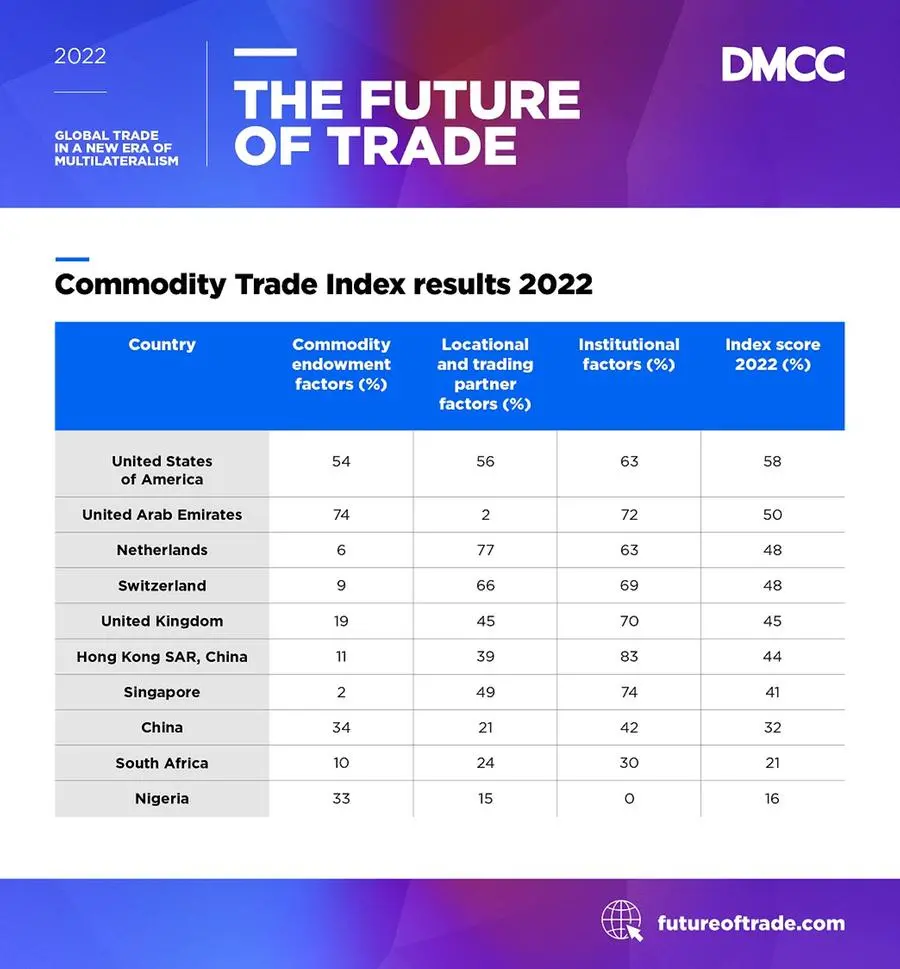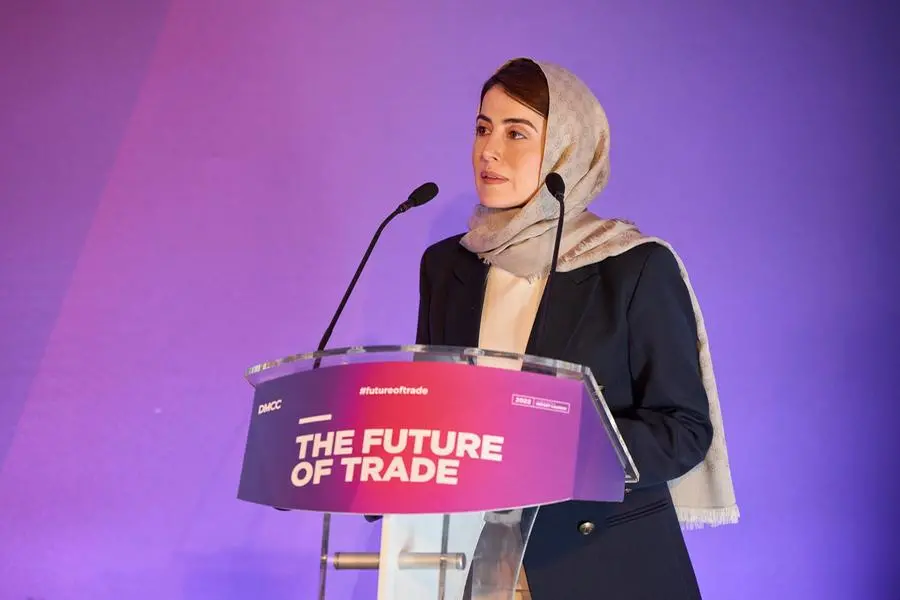PHOTO
- Third iteration of the Commodity Trade Index released in DMCC’s Future of Trade 2022 report
- Index assesses the role of 10 key trading hubs within global trade
Dubai, UAE: The United Arab Emirates (UAE) has maintained its position among the top global commodity trading hubs, according to the third iteration of the Commodity Trade Index presented in DMCC’s latest Future of Trade 2022 report.
The Commodity Trade Index assesses the role of ten key trading hubs within global trade, ranking these countries in terms of their significance in the global commodities trade. The rankings are based on an analysis of ten indicators across three major factors: locational and trading partners, commodity endowments and institutional factors.
The 2022 Commodity Trade Index sees the United States maintain its position as the top global trading hub, scoring 58% overall, despite not recording the highest score in any of the three individual index pillars. Having led the index in its first iteration in 2018, the UAE stands in the second place with a score of 50%. The Netherlands entered the top three hubs for the first time, scoring 48%. Despite the rankings remaining relatively similar between 2020 and 2022, the spread between the top and bottom hubs became wider, suggesting that the pandemic has widened pre-existing gaps between countries in terms of their importance for commodities trade.


Feryal Ahmadi, Chief Operating Officer, DMCC, said: “Over the past few years, the commodities market has been heavily impacted by the pandemic and the associated supply chain issues. This has been compounded by additional macroeconomic factors such as heightened geopolitical tensions. The global economic environment remains challenging, however, the Commodity Trade Index proved that the UAE has firmly maintained its position as a world leading trade hub. Building on this momentum, DMCC will continue to prioritise increasing the ease of doing business and promoting the huge commercial potential that Dubai possesses.”
The UAE recorded the top score for commodity endowment factors (74%), well ahead of all the other trading hubs, driven by its large natural supply of oil. The country came third for institutional factors (72%), largely due to its attractive tax rates and strong performance for logistics of trade.
The rankings for the other global commodity trade hubs include, Switzerland (48%), the United Kingdom (45%), Hong Kong (44%), Singapore (41%), China (32%), South Africa (21%) and Nigeria (16%).
The Future of Trade report is a synthesis of global viewpoints based on research, data and interviews with business leaders and trade experts. The 2022 edition of the report examines the changing nature of global trade, highlighting the role that geopolitics, technology and global economic trends will play in the future of trade, with a focus on trade growth, supply chains, trade finance, infrastructure and sustainability. In addition, it provides tangible recommendations to governments, policymakers and businesses that target trade growth.
For more information on the Commodity Trade Index and to read the full Future of Trade report by DMCC, please visit: www.futureoftrade.com
The Commodity Trade Index looks at three major factors that are important to commodity trade, across ten individual sub-indicators:
- Locational and trading partner factors
- Headquarter locations of major commodities trading houses
- Proximity to markets (based on commodity export data)
- Commodity trade partner tariffs on primary goods
- Commodity endowment factors
- Tons of oil exported annually
- Hub’s share of global commodity trade for coffee, grains, sugar, gold, diamonds, soya bean, tea, cotton, silver, animals and animal products and plastic
- Natural resource rents as a share of GDP
- Institutional factors
- Financial services infrastructure
- Attractiveness of the tax regime
- Strength of contract enforcement
- Logistics performance
-Ends-
Media Enquiries:
DMCC
PR & Corporate Communications
pr@dmcc.ae
About DMCC
Headquartered in Dubai, DMCC is the world’s most interconnected Free Zone, and the leading trade and enterprise hub for commodities. Whether developing vibrant neighbourhoods with world-class property like Jumeirah Lakes Towers and the much-anticipated Uptown Dubai, or delivering high performance business services, DMCC provides everything its dynamic community needs to live, work and thrive. Made for Trade, DMCC is proud to sustain and grow Dubai’s position as the place to be for global trade today and long into the future. www.dmcc.ae
About The Future of Trade
The Future of Trade 2020 is the third edition of DMCC’s flagship report exploring the changing nature of global trade following reports in 2016 and 2018. The report examines the impact of geopolitics, technology, and global economic trends on the future of trade, with a focus on trade growth, supply chains, trade finance, infrastructure and sustainability.
The report is a synthesis of global viewpoints on what the future holds based on research, data, and interviews with business leaders and trade experts across eight key trade hubs – Dubai, London, Houston, Johannesburg, Shenzhen, Silicon Valley, Singapore, and Zurich.
The Future of Trade 2020 maps out the scenarios for how trade will develop in the 2020s and is relevant for any reader involved in trade, trade policy, international investment, and the operation of businesses with global value chains. www.futureoftrade.com




















